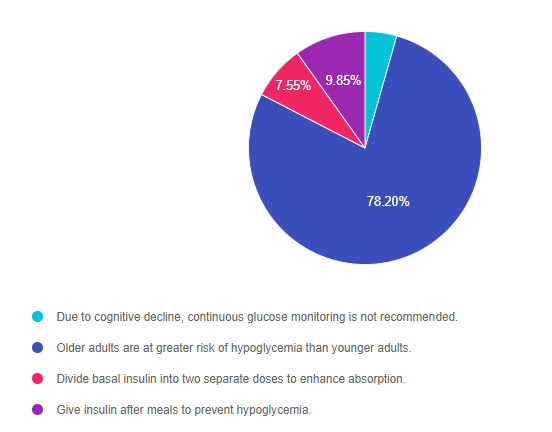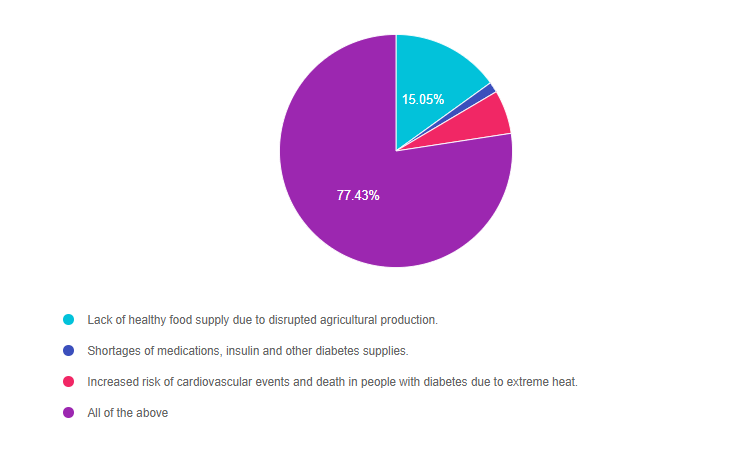
Subscribe
eNewsletter

Ready to get certified?
Free CDCES Coach App
Download
Free Med Pocket Cards

JL is a new nursing graduate and asks you questions about glucose monitoring in the inpatient setting. Which of the following statements is most accurate regarding providing diabetes care in the hospital setting?
Click Here to Test your Knowledge

Research clearly demonstrates the importance of glucose control during hospitalization to improve outcomes not only in the inpatient setting but after discharge. This course reviews the evidence that supports inpatient glucose control and outlines practical strategies to achieve targets in the inpatient setting. We incorporate the latest ADA Standards and provide links to resources and inpatient management templates.
Objectives:
The use of DES products does not guarantee the successful passage of the CDCES exam. CBDCE does not endorse any preparatory or review materials for the CDCES exam, except for those published by CBDCE.
Research clearly demonstrates the importance of glucose control during hospitalization to improve outcomes not only in the inpatient setting but after discharge. This course reviews the evidence that supports inpatient glucose control and outlines practical strategies to achieve targets in the inpatient setting. We incorporate the latest ADA Standards and provide links to resources and inpatient management templates.
Objectives:
This bundle includes our CDCES Online Prep Bundle plus the ADCES Review Guide.
The online bundle includes Level 1, Level 2, and Level 3 (Boot Camp), plus two bonus courses. The ADCES Review Guide offers over 480+ practice questions and is a fantastic independent study tool and comprehensive resource for the Diabetes Care and Education Specialist Exam.
Read More: What is a CDCES? First awarded in 1986, as Certified Diabetes Educator (CDE) credential and in 2020 with a new name: Certified Diabetes Care and Education Specialist (CDCES) to more accurately reflect the specialty. CDCES has become a standard of excellence for the delivery of quality diabetes education. Those who hold this certification are known to possess comprehensive knowledge of and experience in diabetes prevention, management, and prediabetes. “Becoming a Certified Diabetes Care and Education Specialist (CDCES) is one of the best professional and personal decisions I have ever made.” – Coach Beverly Thomassian, RN, MPH, CDCES, BC-ADM 
Read More: 3 Reasons to Become a CDCES “The best part of becoming a CDCES is working with my colleagues and people living with diabetes. As diabetes educators, we hear compelling and beautiful life stories. I am astounded by the barriers they face and inspired by their adaptability, problem-solving skills, and resilience.” Reason 1: CDCES is a widely recognized certification by employers and health care professionals throughout the U.S. This credential demonstrates a specialized and in-depth knowledge in the prevention and treatment of individuals living with pre-diabetes and diabetes. Reason 2: Currently, 10% of people in the U.S. have diabetes and another 35% have pre-diabetes which means 45% of Americans are running around with elevated blood glucose levels. Given this epidemic, there will be plenty of future job opportunities. Reason 3: Having my CDCES along with my nursing degree, has opened many doors of opportunity; from working as an inpatient Diabetes Nurse Specialist in a hospital to working as a Manager of Diabetes Education in the outpatient setting to starting my own consulting company.
Sign up for Diabetes Blog Bytes – we post one daily Blog Byte from Monday to Friday. And of course, Tuesday is our Question of the Week. It’s Informative and FREE! Sign up below!
The use of DES products does not guarantee the successful passage of the CDCES exam. CBDCE does not endorse any preparatory or review materials for the CDCES exam, except for those published by CBDCE.
The injectable GLP-1 semaglutide (Ozempic) can now be dosed up to 2.0mg a week. This higher maximum dose provides greater reductions in body weight (6.9kgs vs 6.0kgs) and A1c (2.2 vs 1.9% ) when compared to 1.0 semaglutide dose. There was a comparable safety profile with both doses. However, more people experienced negative gastrointestinal side effects when receiving the higher dose (34% compared to 30.8%).

This is good news for people with type 2 diabetes who would like to benefit from both A1C and weight reduction. Plus, semaglutide lowers the risk of cardiovascular events.
Without insurance coverage, this medication costs about $1000 for a month’s supply. However, since semaglutide (Ozempic) is an established diabetes medication covered by many insurance plans, we are hopeful that people who would benefit from this therapy will have access to this higher dose.
The SUSTAIN FORTE trial lasted for 40-weeks and enrolled 961 patients with type 2 diabetes with an A1C of 8.0-10.0%. All patients in the trial initiated treatment with a 0.25 mg dose of semaglutide that was doubled every 4 weeks until the target dose was achieved.
In addition to reduction in A1C and body weight, the semaglutide 2.0 mg arm of the trial saw a greater proportion of patients achieve an A1C less than 7% (67.6% vs 57.5% [OR, 1.60; 95% CI, 1.21-2.13; P=.001]) or a body weight reduction greater than 5% (59.2% vs 51.3% [OR, 1.41; 95% CI, 1.08-1.84]) than the semaglutide 1.0 mg arm.
We have updated our Diabetes Medication PocketCard with this higher maximum dose or our website, CDCES Coach App, and printed PocketCards.
This bundle includes our CDCES Online Prep Bundle plus the ADCES Review Guide.
The online bundle includes Level 1, Level 2, and Level 3 (Boot Camp), plus two bonus courses. The ADCES Review Guide offers over 480+ practice questions and is a fantastic independent study tool and comprehensive resource for the Diabetes Care and Education Specialist Exam.
Read More: What is a CDCES? First awarded in 1986, as Certified Diabetes Educator (CDE) credential and in 2020 with a new name: Certified Diabetes Care and Education Specialist (CDCES) to more accurately reflect the specialty. CDCES has become a standard of excellence for the delivery of quality diabetes education. Those who hold this certification are known to possess comprehensive knowledge of and experience in diabetes prevention, management, and prediabetes. “Becoming a Certified Diabetes Care and Education Specialist (CDCES) is one of the best professional and personal decisions I have ever made.” – Coach Beverly Thomassian, RN, MPH, CDCES, BC-ADM Read More: 3 Reasons to Become a CDCES “The best part of becoming a CDCES is working with my colleagues and people living with diabetes. As diabetes educators, we hear compelling and beautiful life stories. I am astounded by the barriers they face and inspired by their adaptability, problem-solving skills, and resilience.“ Reason 1: CDCES is a widely recognized certification by employers and health care professionals throughout the U.S. This credential demonstrates a specialized and in-depth knowledge in the prevention and treatment of individuals living with pre-diabetes and diabetes. Reason 2: Currently, 10% of people in the U.S. have diabetes and another 35% have pre-diabetes which means 45% of Americans are running around with elevated blood glucose levels. Given this epidemic, there will be plenty of future job opportunities. Reason 3: Having my CDCES along with my nursing degree, has opened many doors of opportunity; from working as an inpatient Diabetes Nurse Specialist in a hospital to working as a Manager of Diabetes Education in the outpatient setting to starting my own consulting company. For last week’s practice question, we quizzed test takers on if insulin is safe for older adults. 78% of respondents chose the best answer. We want to share this important information, so you can pass it on to people living with diabetes and your colleagues, plus prepare for exam success! Before we start though, if you don’t want any spoilers and haven’t tried the question yet, you can answer it below: Answer Question Question: For older adults with diabetes using insulin therapy, which of the following is the most accurate statement? Answer Choices: As shown above, the most common choice was option 2, the second most common answer was option 4, then option 3, and finally 1. Answer 1 is incorrect. 4.40% chose this answer, “Due to cognitive decline, continuous glucose monitoring is not recommended for older adults.” Many older adults on intensive insulin therapy with a history of hypoglycemia can benefit from CGM technology to prevent low blood sugars and fine tune carb intake and insulin dosing. Each older adult needs a individualized assessment to determine if a CGM is right for them. The rate of cognitive decline is complex and is a result of genetics, other chronic conditions and overall health combined with aging. Answer 2 is correct. 78.20% of you chose this answer, “Older adults are at greater risk of hypoglycemia than younger adults. GREAT JOB, almost 80% of you chose this best answer. As people with diabetes age, they are at higher risk for low blood sugars for many reasons, especially if they are taking insulin or a secretagogue. Older individuals may have diminished renal function, which increases the duration of the action of insulin and secretagogues. Some can experience lower calorie intake due to decreasing appetite, trouble chewing, lack of resources, forgetfulness or depression and feelings of isolation. Others may have difficulty administering their insulin or medications accurately or may forget to eat after injections. For this reason, the ADA Standards recommends that older adults are assessed for hypoglycemia risk at each visit coupled with problem solving as needed. Answer 3 is incorrect. 7.55% of respondents chose this answer, “Divide basal insulin into two separate doses to enhance absorption.” This is a juicy answer. For older adults at risk for hypoglycemia, the ADA does recommend scheduling the basal insulin for the morning instead of evening. Finally, Answer 4 is incorrect. 9.85% chose this answer, “Give insulin after meals to prevent hypoglycemia.” Another juicy answer. This answer implies that all older people should take their insulin after meals. Some individuals might benefit from post-meal insulin, especially if they are not sure how much they are going to eat and they have a history of hypoglycemia. However, insulin works best when given before the meal so it peaks at the same time the post meal glucose is peaking. This bundle includes our CDCES Online Prep Bundle plus the ADCES Review Guide. The online bundle includes Level 1, Level 2, and Level 3 (Boot Camp), plus two bonus courses. The ADCES Review Guide offers over 480+ practice questions and is a fantastic independent study tool and comprehensive resource for the Diabetes Care and Education Specialist Exam. Read More: What is a CDCES? First awarded in 1986, as Certified Diabetes Educator (CDE) credential and in 2020 with a new name: Certified Diabetes Care and Education Specialist (CDCES) to more accurately reflect the specialty. CDCES has become a standard of excellence for the delivery of quality diabetes education. Those who hold this certification are known to possess comprehensive knowledge of and experience in diabetes prevention, management, and prediabetes. “Becoming a Certified Diabetes Care and Education Specialist (CDCES) is one of the best professional and personal decisions I have ever made.” – Coach Beverly Thomassian, RN, MPH, CDCES, BC-ADM Read More: 3 Reasons to Become a CDCES “The best part of becoming a CDCES is working with my colleagues and people living with diabetes. As diabetes educators, we hear compelling and beautiful life stories. I am astounded by the barriers they face and inspired by their adaptability, problem-solving skills, and resilience.” Reason 1: CDCES is a widely recognized certification by employers and health care professionals throughout the U.S. This credential demonstrates a specialized and in-depth knowledge in the prevention and treatment of individuals living with pre-diabetes and diabetes. Reason 2: Currently, 10% of people in the U.S. have diabetes and another 35% have pre-diabetes which means 45% of Americans are running around with elevated blood glucose levels. Given this epidemic, there will be plenty of future job opportunities. Reason 3: Having my CDCES along with my nursing degree, has opened many doors of opportunity; from working as an inpatient Diabetes Nurse Specialist in a hospital to working as a Manager of Diabetes Education in the outpatient setting to starting my own consulting company. Sign up for Diabetes Blog Bytes – we post one daily Blog Byte from Monday to Friday. And of course, Tuesday is our Question of the Week. It’s Informative and FREE! Sign up below! The use of DES products does not guarantee the successful passage of the CDCES exam. CBDCE does not endorse any preparatory or review materials for the CDCES exam, except for those published by CBDCE. AR says they just found out they are pregnant. AR has type 2 diabetes and polycystic ovary syndrome and takes metformin 1000mg BID, semaglutide (Ozempic) 1.0mg weekly, and 30 units glargine insulin for diabetes management. Her most recent A1C was 8.2%. What is the most important action to take? Click Here to Test your Knowledge Pregnancy with diabetes is confronted with a variety of issues that require special attention, education, and understanding. This course reviews those special needs while focusing on Gestational Diabetes and Pre-Existing Diabetes. Included are the most recent diagnostic criteria, management goals, and prevention of complications during pregnancy. A helpful review for the CDCES Exam and for those who want more information on people who are pregnant and live with Diabetes. Objectives: The use of DES products does not guarantee the successful passage of the CDCES exam. CBDCE does not endorse any preparatory or review materials for the CDCES exam, except for those published by CBDCE. There are so many amazing and dedicated people and organizations working to revitalize our planet. To make it easy to explore these opportunities, Bryanna and I put together this list with the hope that you find inspiration for action. Thank you. Please enjoy these FREE resources that we have put together for you: The use of DES products does not guarantee the successful passage of the CDCES exam. CBDCE does not endorse any preparatory or review materials for the CDCES exam, except for those published by CBDCE. When I was considering college, my dad offered me some simple advice, “Why don’t you become a nurse?” Four years later, I stood proudly with my white cap and nursing pin securely fastened as an RN graduate. As I reflect on my years in this noble profession, I have witnessed the most unselfish acts of love and pure heroism by my nursing colleagues. I have highlighted some top qualities that represent my gratitude, but this thank you list could encompass an entire page. This week is a perfect time to let our nursing colleagues, mentors, professors, and friends know how much they are appreciated. Coach Beverly thanks each nurse who has cared for me, held my hand, and reassured me that I am going to be okay. These are just a few ideas to get started. As you think of that special moment of gratitude, maybe you will come up with the perfect idea for that one special nurse. With gratitude, Coach Beverly Sign up for Diabetes Blog Bytes – we post one daily Blog Byte from Monday to Friday. And of course, Tuesday is our Question of the Week. It’s Informative and FREE! Sign up below! The use of DES products does not guarantee the successful passage of the CDCES exam. CBDCE does not endorse any preparatory or review materials for the CDCES exam, except for those published by CBDCE. For last week’s practice question, we quizzed test takers on how diabetes and earth health are interconnected. 78% of respondents chose the best answer, GREAT JOB. We want to share this important information, so you can pass it on to people living with diabetes and your colleagues. We can all take action to protect the earth and prepare for extreme climate events. Before we start though, if you don’t want any spoilers and haven’t tried the question yet, you can answer it below: Answer Question Question: According to a NIH systematic literature review, there is clear evidence that diabetes and climate change are interconnected. Which of the following situations are due to the impact of a changing climate? Answer Choices: As shown above, the most common choice was option 4, the second most common answer was option 1, then option 3, and finally 2. Answer one – 15.05% chose this answer, and it is accurate “Lack of healthy food supply due to disrupted agricultural production.” It is true that extreme weather can result in agricultural production disruptions. In our community, many fields that were once green with trees and crops, now are brown and barren. There is not enough water to keep crops alive and growing. When the healthy food supply is limited, people living with diabetes may turn to lower-cost, processed foods which are environmentally unfriendly and low in nutrients. Answer two – 1.46% of you chose this answer and it is accurate, “Shortages of medications, insulin, and other diabetes supplies.” It is true that with recent climate disasters, like the Camp Fire, Hurricane Katrina in 2005, and Hurricane Harvey in 2017, resulted in people not being able to access, afford or safely store their medications, including insulin. In addition, we are experiencing supply chain disruptions in D50 (25 grams of glucose in a 50 ml prefilled syringe (50% glucose)) to treat hypoglycemia and certain intravenous fluids are in short supply. Other diabetes products and medications could be impacted in the future. Answer three – 6.07% of respondents chose this answer and it is accurate, “Increased risk of cardiovascular events and death in people with diabetes due to extreme heat.” It is true that people with diabetes are at greater risk of experiencing dehydration and cardiovascular events during periods of extreme heat. With the increasing frequency of extreme heat episodes, there is an associated increased risk of heat-related death and cardiovascular events for people living with diabetes. Several studies reveal that people with diabetes have a higher risk of death on hot days, and are more likely to need emergency care and those with a history of heart disease are most vulnerable. Finally, Answer four – 77.43% chose this answer, “All of the above.” YES. Great job, all of the answers are true, there is clear evidence that diabetes and climate changes are interconnected. As Diabetes Specialists, I believe we can make a difference by leaning into our unique blend of behavior change skills, advocacy, and scientific knowledge. This bundle includes our CDCES Online Prep Bundle plus the ADCES Review Guide. The online bundle includes Level 1, Level 2, and Level 3 (Boot Camp), plus two bonus courses. The ADCES Review Guide offers over 480+ practice questions and is a fantastic independent study tool and comprehensive resource for the Diabetes Care and Education Specialist Exam. Read More: What is a CDCES? First awarded in 1986, as Certified Diabetes Educator (CDE) credential and in 2020 with a new name: Certified Diabetes Care and Education Specialist (CDCES) to more accurately reflect the specialty. CDCES has become a standard of excellence for the delivery of quality diabetes education. Those who hold this certification are known to possess comprehensive knowledge of and experience in diabetes prevention, management, and prediabetes. “Becoming a Certified Diabetes Care and Education Specialist (CDCES) is one of the best professional and personal decisions I have ever made.” – Coach Beverly Thomassian, RN, MPH, CDCES, BC-ADM Read More: 3 Reasons to Become a CDCES “The best part of becoming a CDCES is working with my colleagues and people living with diabetes. As diabetes educators, we hear compelling and beautiful life stories. I am astounded by the barriers they face and inspired by their adaptability, problem-solving skills, and resilience.” Reason 1: CDCES is a widely recognized certification by employers and health care professionals throughout the U.S. This credential demonstrates a specialized and in-depth knowledge in the prevention and treatment of individuals living with pre-diabetes and diabetes. Reason 2: Currently, 10% of people in the U.S. have diabetes and another 35% have pre-diabetes which means 45% of Americans are running around with elevated blood glucose levels. Given this epidemic, there will be plenty of future job opportunities. Reason 3: Having my CDCES along with my nursing degree, has opened many doors of opportunity; from working as an inpatient Diabetes Nurse Specialist in a hospital to working as a Manager of Diabetes Education in the outpatient setting to starting my own consulting company. Sign up for Diabetes Blog Bytes – we post one daily Blog Byte from Monday to Friday. And of course, Tuesday is our Question of the Week. It’s Informative and FREE! Sign up below! The use of DES products does not guarantee the successful passage of the CDCES exam. CBDCE does not endorse any preparatory or review materials for the CDCES exam, except for those published by CBDCE. 
Why become a CDCES?
Three Reasons from Coach Beverly Rationale of the Week | Insulin safe for older adults?


Getting to the Best Answer
Studying for the CDCES Exam?
Enroll in CDCES Online Prep Bundle + 5th Ed ADCES Review Guide Book | 47 CEs
What is a Certified Diabetes Care and Education Specialist?

Why become a CDCES?
Three Reasons from Coach Beverly Question of the Week | Which diabetes meds safe during pregnancy?

Want to learn more about this question? Join us for our webinar
Pregnancy & Diabetes Standards | Level 2 | $29 for 1.5 CEs
Recorded & Ready to Watch!

How to Protect the Planet – Resources Page
Sustainable Eating

Gardening & Water Saving
Reduce Plastic Usage & Composting
Reduce Carbon Footprint
Sustainable Living
DiabetesEd Free Resources

Happy International Nurses Day – 5 Ways to say Thank You
Like the founder of nursing, Florence Nightingale, you are all “Holding the Lamp” and shining it in dark places that are often scary and unknown to provide comfort to those with the greatest need.

5 Ways to Thank a Nurse
Rationale of the Week | Diabetes and Earth Health interconnected?


Getting to the Best Answer
We can take a two-fold approach:Studying for the CDCES Exam?
Enroll in CDCES Online Prep Bundle + 5th Ed ADCES Review Guide Book | 47 CEs
What is a Certified Diabetes Care and Education Specialist?

Why become a CDCES?
Three Reasons from Coach Beverly